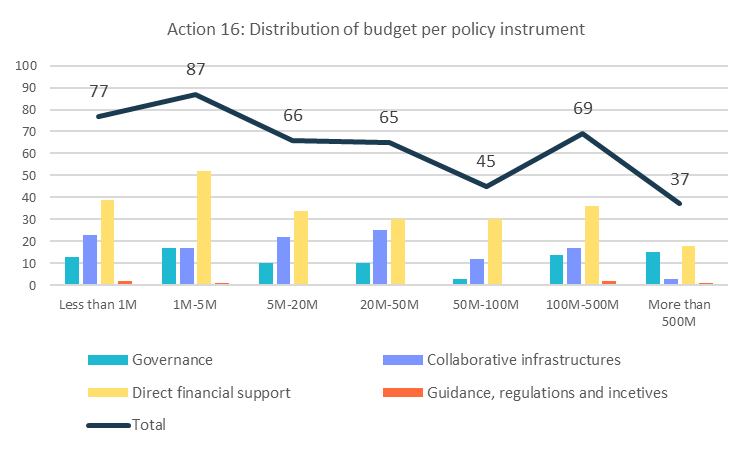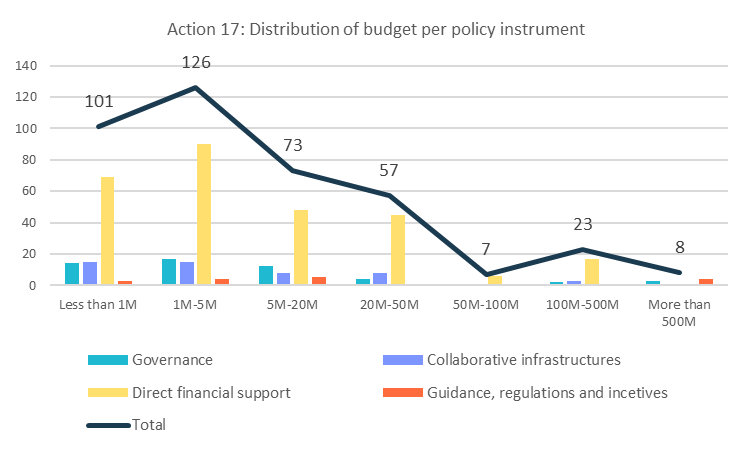- Action 16: Improve EU-wide access to excellence
-
The activities of Action 16 started officially in 2023 with the setting up of the Expert Sub-group and the organization of the first kick-off meeting.
Early achievements from these activities include the initial identification of synergies actions between Cohesion funding and Horizon Europe in terms of designing and implementing new synergies tools, such as possibilities of transfers from ERDF programmes to Horizon Europe, mobilization of ERDF to be used as national contribution for Horizon Europe Co-funded and Institutionalised Partnerships. This also encompasses the identification of data needs and existing gaps to better create and monitor the creation of synergies between both funding programmes, including the upstream and downstream synergies.
In addition, the initial identification of different governance modalities as a starting point for possible future improvements are also part of the initial achievements of this action.
A policy survey to better understand the use of synergies at Member State level as well as the identification of bottlenecks to do so is ongoing and will provide ground for future actions under the Expert sub-group.
Action 16 is in line with the 2021 Council of the European Union Recommendation on ‘Deepening the European Research Area: Providing researchers with attractive and sustainable careers and working conditions and making brain circulation a reality’. The latter explicitly welcomed widening actions, helping ‘to design and implement reforms of the R&I systems’.
Action 16 was developed to complement and strengthen national R&I strategies and interdependent cohesion policy programmes and national, regional, and private investments. Several instruments are included in Action 16’s package under Horizon Europe and aim at improving excellence, such as:
-
Teaming, Twinning, Excellence hubs: Teaming actions aim to either create or modernise centres of excellence in Widening Countries. This is to be achieved by the establishment of strategic partnerships with leading institutions abroad. Twinning activities aim at enhancing networking opportunities between research institutions of the Widening Countries (acting as coordinators), and their leading counterparts, at least two research institutions from two different EU countries or Associated Countries, to facilitate the exchange of best practices. Excellence Hubs aim to strengthen placed-based innovation and excellence through the establishment of cross-boarder partnerships of ‘innovation ecosystems’ in Widening Countries.
-
The European Excellence Initiative: This action aims at empowering universities as drivers of change in relation to R&D and create opportunities for cooperation between HEIs.
-
For empowering brain circulation, the action ERA talents aims for cross-sectoral talent circulation and academia-business collaboration, and the action ERA fellowships gives specific support for excellent researchers from Widening Countries not funded through the Marie Skłodowska-Curie Actions
-
Hop-on facility: This action aims at providing opportunities to research institutions from Widening countries to join ongoing R&I actions under Horizon Europe Pillar 2 and the EIC Pathfinder.
-
COST is funding scientific networking that pools resources and results of nationally funded research activities. It serves also as an incubator for successful research proposals under Horizon Europe. 80% of COST’s budget is devoted to widening actions and 50% of its budget is invested in Inclusiveness Target Countries (ITCs).
-
ERA Chairs: This action shall attract high-level researchers to a university or research centre located in a Widening country and establish a research team fully integrated in the coordinator's institution, thereby increasing its research capacity and considerably improving its research performance in a scientific domain of choice.
-
For improving the quality and quantity of proposals from widening countries – a special action is dedicated to the strengthening of the National Contact Point network by developing its services in pre-proposal checks, match making activities, consultation, etc.
-
A new call Pathways to synergies has been introduced in 2023 as a dedicated action fostering upstream or downstream synergies (applicants may choose). This will provide support for additional efforts required for setting up the interfaces between two different funding systems where major barriers still occur due to the mismatches of regional versus European approach, consortium vs single beneficiary funding and Horizon thematic priorities vs national/regional smart specialization.
-
Another new call in 2023 - Dissemination and Exploitation Support Facility is focusing on activities to strengthen or build D&E capacities in widening countries and will provide beneficiaries of the ongoing portfolio of widening projects with further opportunities for scaling up their research results and improve the sustainability of their actions.
Additional instruments may be included in the future calls of the upcoming Work Programmes.
The 2023 OECD STIP Survey offers some relevant insights on key themes related to Action 16.

Figure 34: Action 16: Distribution of budget per policy instrument
Figure 47 shows the distribution of budget allocation for policies related to Action 16 at EU level (27 Member States). It indicates that the majority of Action 16-related policies are being funded within a yearly budget between EUR 1M and EUR 5M or of less than EUR 1M. Thirty-seven policies benefit from large amounts of funding, with more than EUR 500 M. An example of an initiative with more than EUR 500 million is the Spanish State Plan for Scientific and Technological Research and Innovation 2021-2023.
Lastly, the graph above shows that the key policy instruments related to Action 16 include direct financial support (42%), followed by governance instruments (32%). Collaborative infrastructures also represent an important policy instrument to implement policies related to Action 16 (24%). Guidance, regulation and incentives are the policy instrument used in a minority of cases (2%).
-
- Action 17: Enhance public research institutions’ strategic capacity
-
Horizon Europe’s approach to supporting research management initiatives is consistent with Action 17 of the ERA Policy Agenda. This commitment to promoting best practices in research management, open science, and innovation is reflected in various projects and initiatives implemented under Horizon Europe. The EOSC has emerged as a significant catalyst for actions and policies on research management under the Horizon Europe program.
The Strategic Research and Innovation Agenda (SRIA), published in 2022 by ESOC, provides a comprehensive roadmap for the next seven years. It outlines a vision to establish an operational ‘Web of FAIR data and services’ for science. It aims to transform research management by creating an open and trusted environment for accessing anad managing publicly funded research data and digital outputs. This transformative approach seeks to change how researchers access and share digital knowledge throughout the research lifecycle, leading to advancements in research data management and scientific progress. The SRIA represents the collaborative efforts of research-performing organisations, research-funding organisations, research infrastructures, research libraries, and research associations which have actively participated in the co-creation process.
One notable project is RITrainPlus, which builds upon the previous RItrain project (2015-2020). RITrainPlus focuses on developing the skills and competences of research infrastructure managers through the implementation of Continuous Professional Development courses (CPDs), the creation of a foundation for the long-term provision of highly qualified personnel for managing research infrastructures and the establishment of a European School for the Management of Research Infrastructures. Additionally, Horizon Europe's Science with and for Society (SwafS) and its Responsible Research and Innovation (RRI) program support the development of best practices and promote the integration of responsible research and innovation principles into research management.
Horizon Europe contributes to through the EIT's (European Institute of Innovation and Technology) HEI Initiative, which supports higher education institutions by providing expertise, coaching, access to the EIT innovation ecosystem and funding. The goal is to assist these institutions in developing innovation action plans that align with their specific needs, further enhancing their strategic capacity in research management.
Moreover, under the specific call ‘HORIZON-WIDERA-2021-ERA-01-20: Towards a Europe-wide training and networking scheme for research managers’ , two Coordination and Support Actions (CSA) projects were initiated in 2022. The first project, CARDEA, coordinated by the University College Cork, aims to professionalise research management as a valued career choice within the European Research Area . CARDEA is developing a careers and competences framework for research managers at European level.
The second project, RM ROADMAP, led by EARMA (European Association of Research Managers and Administrators), seeks to connect existing European networks through an innovative community platform for research management. RM ROADMAP developed a network of ‘RM Ambassadors’ in over 40 countries, who will support the establishment or maintenance of national communities of research managers, structurally liaise with national policy makers, collect the needs and develop actions to improve upskilling.
Twinning actions prioritise establishing Research Support Offices, enhancing the research management capacities and administrative skills of the technical and administrative staff working in institutions from Widening countries, with more than 100 projects funded per Twinning Call. This programme strengthens networking among research institutions in Widening countries, serving as coordinators, and their top-tier European Union counterparts by connecting institutions from different Member States or Associated Countries.
Information from the 2023 OECD STIP Survey suggests that policy instruments related to Action 17 predominantly fall under direct financial support, as illustrated in Figure 35. Governance instruments constitute the second most common type, followed by collaborative infrastructures and policies relying on guidance, regulation, and incentives. No policies utilising indirect financial support were identified across the 27 Member States.

Figure 35: Action 17: Distribution of budget per policy instrument
National policy example
As illustrated in the STIP survey, current policy debates related to Action 17 indicate that Latvia, for example, is making significant efforts in enhancing research management. The establishment of the Innovation and Research Management Council in 2022 fostered closer cooperation among key institutions, overseeing the implementation and management of research, development, and innovation policies, including RIS3. The involvement of the Latvian Investment and Development Agency (LIAA) has been strengthened, with additional tasks focusing on the systematic engagement of LIAA in developing RIS3 value chain ecosystems and playing a leading role in future scenario development and strategic research.
Similarly, in Czechia, the Government programme statement in 2022 aims at enhancing research management and prioritise science, research, and innovation. The government will focus its efforts on improving the research management system, human resources, funding, technology transfer, and publicity.
The “sponsors” of ERA Action 17 (Germany, Hungary, and the university sector), together with experts in the ERA Forum, developed a set of recommendations for target action at country level and European level to increase the recognition of the profession and develop research managers’ training activities as well as improve accessibility to these. Further activities within ERA Action 17 will focus on capacity building, especially in less R&I intensive regions of Europe, and on further rolling out the networking, upskilling and recognition activities.
